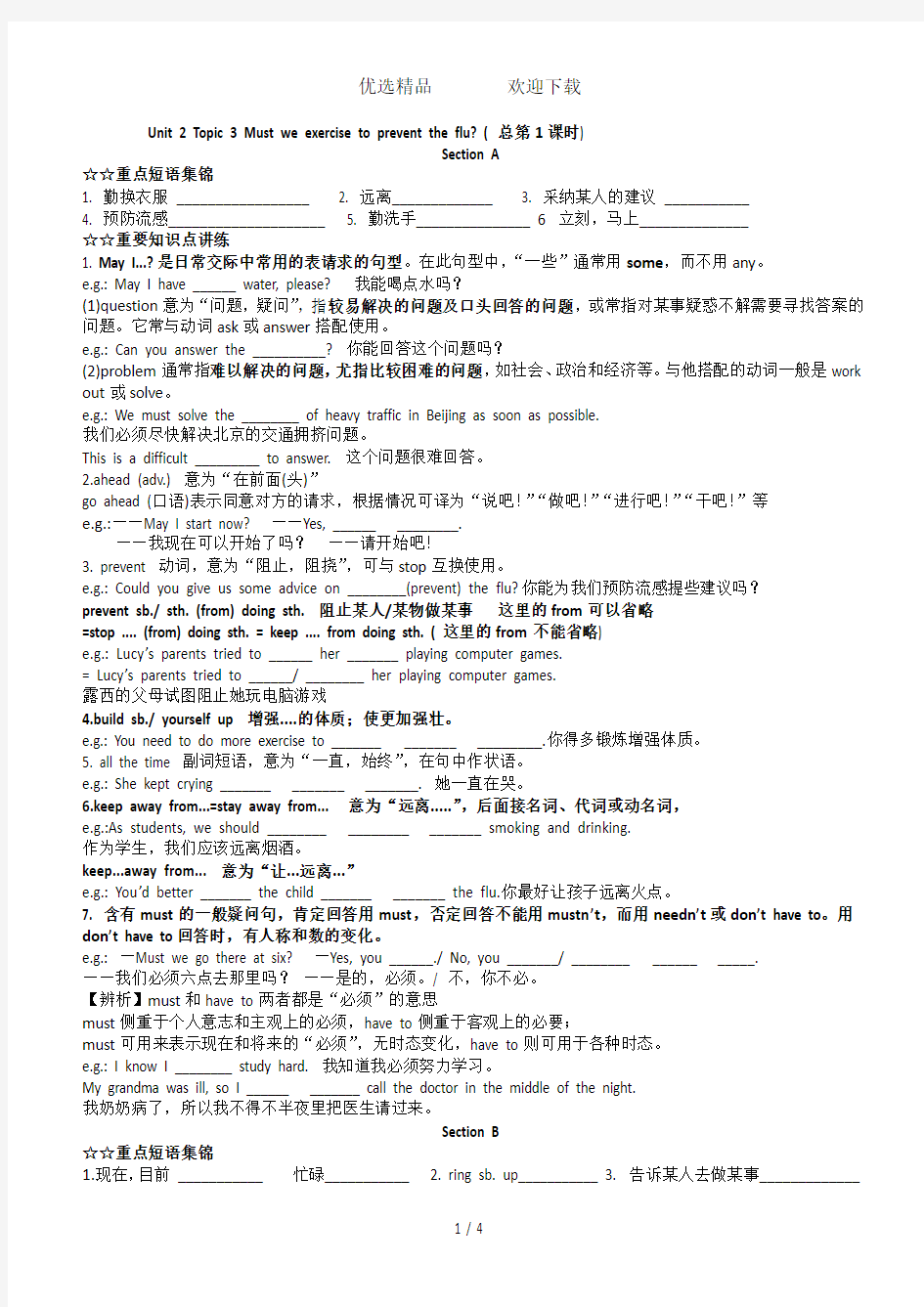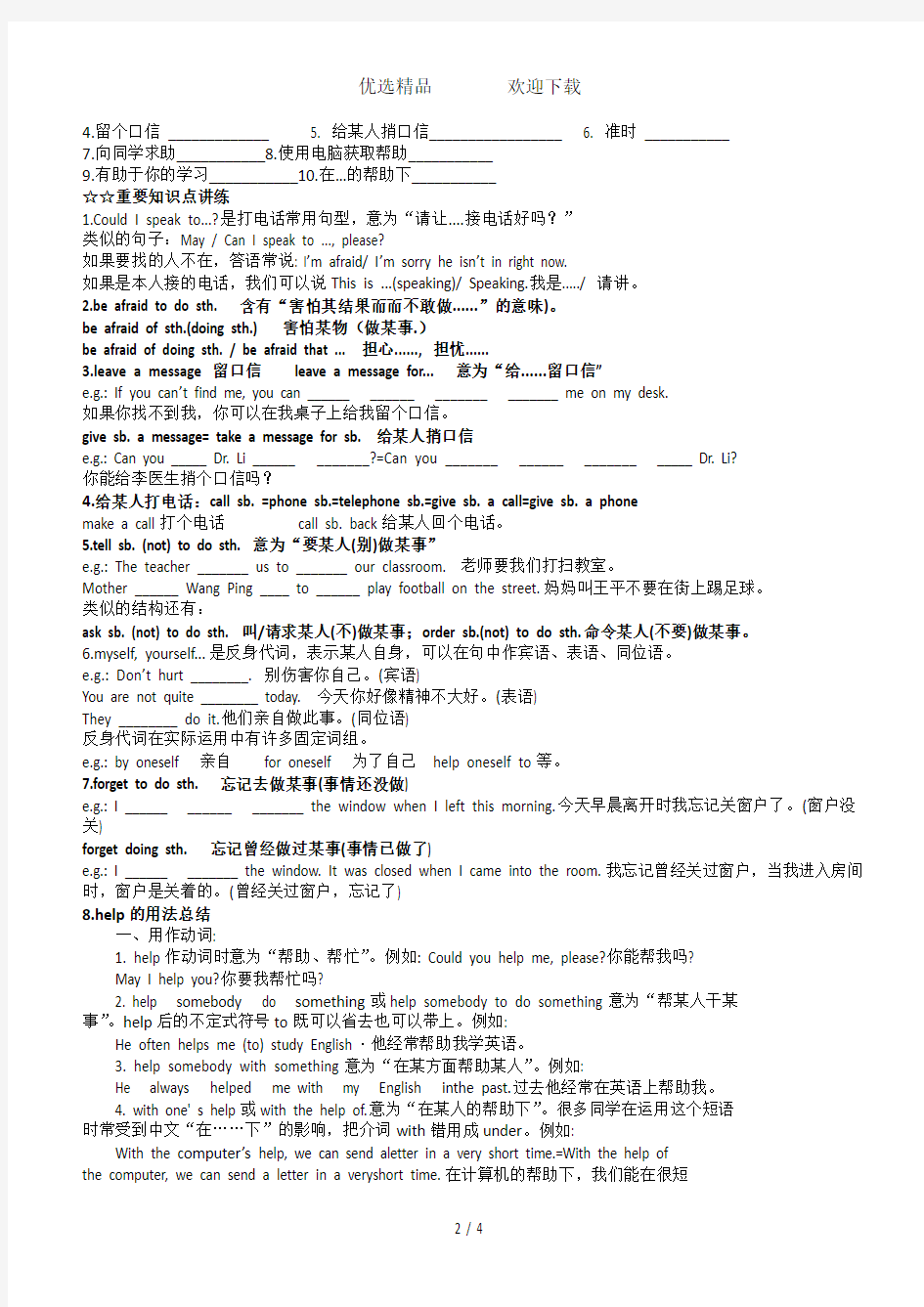

Unit 2 Topic 3 Must we exercise to prevent the flu? (总第1课时)
Section A
☆☆重点短语集锦
1. 勤换衣服_________________
2. 远离_____________
3. 采纳某人的建议___________
4. 预防流感____________________
5. 勤洗手_______________ 6 立刻,马上______________
☆☆重要知识点讲练
1. May I...?是日常交际中常用的表请求的句型。在此句型中,“一些”通常用some,而不用any。
e.g.: May I have ______ water, please? 我能喝点水吗?
(1)question意为“问题,疑问”,指较易解决的问题及口头回答的问题,或常指对某事疑惑不解需要寻找答案的问题。它常与动词ask或answer搭配使用。
e.g.: Can you answer the __________? 你能回答这个问题吗?
(2)problem通常指难以解决的问题,尤指比较困难的问题,如社会、政治和经济等。与他搭配的动词一般是work out或solve。
e.g.: We must solve the ________ of heavy traffic in Beijing as soon as possible.
我们必须尽快解决北京的交通拥挤问题。
This is a difficult _________ to answer. 这个问题很难回答。
2.ahead (adv.) 意为“在前面(头)”
go ahead (口语)表示同意对方的请求,根据情况可译为“说吧!”“做吧!”“进行吧!”“干吧!”等
e.g.:——May I start now? ——Yes, ______ ________.
——我现在可以开始了吗?——请开始吧!
3. prevent 动词,意为“阻止,阻挠”,可与stop互换使用。
e.g.: Could you give us some advice on ________(prevent) the flu?你能为我们预防流感提些建议吗?
prevent sb./ sth. (from) doing sth. 阻止某人/某物做某事这里的from可以省略
=stop .... (from) doing sth. = keep .... from doing sth. (这里的from不能省略)
e.g.: Lucy’s parents tried to ______ her _______ playing computer games.
= Lucy’s parents tried to ______/ ________ her playing computer games.
露西的父母试图阻止她玩电脑游戏
4.build sb./ yourself up 增强....的体质;使更加强壮。
e.g.: You need to do more exercise to _______ _______ ________.你得多锻炼增强体质。
5. all the time 副词短语,意为“一直,始终”,在句中作状语。
e.g.: She kept crying _______ _______ _______. 她一直在哭。
6.keep away from...=stay away from... 意为“远离.....”,后面接名词、代词或动名词,
e.g.:As students, we should ________ ________ _______ smoking and drinking.
作为学生,我们应该远离烟酒。
keep...away from... 意为“让...远离...”
e.g.: You’d better _______ the child _______ _______ the flu.你最好让孩子远离火点。
7. 含有must的一般疑问句,肯定回答用must,否定回答不能用mustn’t,而用needn’t或don’t have to。用don’t have to回答时,有人称和数的变化。
e.g.: —Must we go there at six? —Yes, you ______./ No, you _______/ ________ ______ _____.
——我们必须六点去那里吗?——是的,必须。/ 不,你不必。
【辨析】must和have to两者都是“必须”的意思
must侧重于个人意志和主观上的必须,have to侧重于客观上的必要;
must可用来表示现在和将来的“必须”,无时态变化,have to则可用于各种时态。
e.g.: I know I ________ study hard. 我知道我必须努力学习。
My grandma was ill, so I ______ _______ call the doctor in the middle of the night.
我奶奶病了,所以我不得不半夜里把医生请过来。
Section B
☆☆重点短语集锦
1.现在,目前___________ 忙碌___________
2. ring sb. up___________
3. 告诉某人去做某事_____________
4.留个口信_____________
5. 给某人捎口信_________________
6. 准时___________
7.向同学求助___________8.使用电脑获取帮助___________
9.有助于你的学习___________10.在…的帮助下___________
☆☆重要知识点讲练
1.Could I speak to...?是打电话常用句型,意为“请让....接电话好吗?”
类似的句子:May / Can I speak to ..., please?
如果要找的人不在,答语常说: I’m afraid/ I’m sorry he isn’t in right now.
如果是本人接的电话,我们可以说This is ...(speaking)/ Speaking.我是...../ 请讲。
2.be afraid to do sth. 含有“害怕其结果而而不敢做......”的意味)。
be afraid of sth.(doing sth.) 害怕某物(做某事.)
be afraid of doing sth. / be afraid that ... 担心......, 担忧......
3.leave a message 留口信leave a message for... 意为“给......留口信”
e.g.: If you can’t find me, you can ______ ______ _______ _______ me on my desk.
如果你找不到我,你可以在我桌子上给我留个口信。
give sb. a message= take a message for sb. 给某人捎口信
e.g.: Can you _____ Dr. Li ______ _______?=Can you _______ ______ _______ _____ Dr. Li?
你能给李医生捎个口信吗?
4.给某人打电话:call sb. =phone sb.=telephone sb.=give sb. a call=give sb. a phone
make a call打个电话call sb. back给某人回个电话。
5.tell sb. (not) to do sth. 意为“要某人(别)做某事”
e.g.: The teacher _______ us to _______ our classroom. 老师要我们打扫教室。
Mother ______ Wang Ping ____ to ______ play football on the street.妈妈叫王平不要在街上踢足球。
类似的结构还有:
ask sb. (not) to do sth. 叫/请求某人(不)做某事;order sb.(not) to do sth.命令某人(不要)做某事。
6.myself, yourself...是反身代词,表示某人自身,可以在句中作宾语、表语、同位语。
e.g.: Don’t hurt ________. 别伤害你自己。(宾语)
You are not quite ________ today. 今天你好像精神不大好。(表语)
They ________ do it.他们亲自做此事。(同位语)
反身代词在实际运用中有许多固定词组。
e.g.: by oneself 亲自for oneself 为了自己help oneself to等。
7.forget to do sth. 忘记去做某事(事情还没做)
e.g.: I ______ ______ _______ the window when I left this morning.今天早晨离开时我忘记关窗户了。(窗户没关)
forget doing sth. 忘记曾经做过某事(事情已做了)
e.g.: I ______ _______ the window. It was closed when I came into the room.我忘记曾经关过窗户,当我进入房间时,窗户是关着的。(曾经关过窗户,忘记了)
8.help的用法总结
一、用作动词:
1. help作动词时意为“帮助、帮忙”。例如: Could you help me, please?你能帮我吗?
May I help you?你要我帮忙吗?
2. help somebody do something或help somebody to do something意为“帮某人干某
事”。help后的不定式符号to既可以省去也可以带上。例如:
He often helps me (to) study English·他经常帮助我学英语。
3. help somebody with something意为“在某方面帮助某人”。例如:
He always helped me with my English inthe past.过去他经常在英语上帮助我。
4. with one' s help或with the help of.意为“在某人的帮助下”。很多同学在运用这个短语
时常受到中文“在……下”的影响,把介词with错用成under。例如:
With the c omputer’s help, we can send aletter in a very short time.=With the help of
the computer, we can send a letter in a veryshort time.在计算机的帮助下,我们能在很短
的时间内发出一封信。
☆Section C
☆☆重点短语集锦
1. 健康的饮食习惯___________
2. 提供足够的能量________________
3. 确保安全_______
4. 使你发胖和不健康___________
5.急救______________
6. 另一方面___________________
7.感到不适______________8.拒绝____________ 9.为了_______________
☆☆重要知识点讲练
1.give a talk 做报告
2.need to do sth. 需要做某事
e.g.: 每个人都需要遵守交通规则。Everyone _______ ________ obey the traffic rules.
3.try to do sth. 意为“尽力/量去做某事、设法去做某事”
e.g.: We ______ ______ improve our spoken English.我们尽力去提高我们的英语口语。
try doing sth. 意为“试着去做某事”
e.g.: You should _______ ________(eat) more fruit.你应该试着多吃些水果。
4.stay 意为“保持”,相当于keep,后接形容词、介词或名词等表示状态的词。
e.g.: The store _______ open until late on Tuesdays. 这个商店每周四都开到很晚。
stay 可以表示“保留,待”
e.g.: How long will you _______ in Beijing? 你会在北京待多久?
5.It is+adj.+for sb. to do sth. 中的it是形式主语,动词不定式短语才是真正的主语。(考试常考)
e.g.: _____ ______ ________ for us _______ learn English well. 学好英语对我们很重要。
6.on the other hand 另一方面(完整结构:on one hand...on the other hand意为“一方面...另一方面”)
e.g.: ___ ____ _____ _____, drinking can cause many illnesses.另一方面,喝酒会带来很多疾病。
7. stay away from sth. 远离某物/某事
e.g.: The teacher tells us ______ _________ _________ rugs.老师告诉我们要远离毒品。
8. say no to sth./sb. 对……说不,拒绝某物/某人say no to doing sth. 拒绝做某事
e.g.: Everyone should _______ _______ _______ wars.
类似短语:say hello to.../ say sorry to.../ say thanks to...等
【辨析】(1) say 说,讲。着重讲话的内容,指以口头或书面语言表达。
e.g.: What did he ______? 他说什么?
(2) speak 说话;讲演。一般用作不及物动词;作及物动词时,宾语只能是语言。
e.g.: The baby is ______ to speak. 那小孩正在学讲话。Do you ______ English?你讲英语吗?
(3) tell 告诉;讲述。常用于讲故事(story)、真话(the truth)、谎话(lie);也可以跟双宾语或宾语补足语,tell sb. sth.= tell sth. to sb. 告诉某人某事;tell sb. (not) to do sth.告诉某人(不要) 做某事
e.g.: Please tell him ______ ______ forget his camera. 告诉他别忘记带他的照相机。
(4) talk 谈话,谈论与介词to, with和about连用
e.g.: They are ________ about soccer. 他们正在谈论足球。
☆Section D
☆☆重点短语集锦
热身____________进行任何困难的活动_______________________ 代替 _____________
使你的身体移动__________________ Stay healthy_______________伤着自己______________
几次_______________ keep cool_______________ 小心_________________
☆☆重要知识点讲练
1.the+比较级...,the+比较级... 意为“越...越...”,前后由两个倒装句构成。前句为一般现在时,后句使用一般将来时。这种句式用来表示一方的程度随着另一方程度平行增长。
e.g.: The _____, the ______. 越多越好。
2.stop doing sth. “停止做某事”,表示停止正在做的事情。
e.g.: Stop ______(talk). Please listen to the teacher carefully in class.停止讲话,请认真听老师讲课。
stop to do sth. “停下来去做某事”,表示停下正在做的事而去做另一件事。
e.g.: He stopped ______ _______(talk) with my father.他停下来去和我老爸谈话。
3.instead of 意为“代替,作为...的替换”
e.g.: Now I can walk to work _____ ______ going by car.现在我可以步行去上班,而不必开车了。
4. need sth 需要某物need to do sth 需要做某事
☆☆【本话题语法精讲】
一、复习反身代词
(1)
(2)
反身代词表示某人自己,它可以在句中作宾语、表语、同位语。
口诀:反身代词莫乱用,能做句中宾(宾语)、表(表语)、同(同位语)。
主语、定语不能用,固定搭配要记清。
1.尝试翻译下列短语:
teach oneself ____________________ help oneself to____________________
hurt oneself____________________ enjoy oneself ____________________
dress oneself____________________ look after oneself ____________________
say to oneself__________________ learn sth. by oneself ___________________
2.用适当的反身代词填空:
1). Last weekend we enjoyed ____________ in the park.
2). The boy is too young to look after ___________________.
3). My brother taught ___________ English on the Internet last year.
4). Be careful with that knife, or you will hurt ____________.
5). I see ______________ in the mirror.
6).“What’s wrong with me?”The man asked _________.
7). Mary often washes her clothes by _________.
8). I bought a new dictionary for __________ yesterday.
9). –Did they finish their work by ___________? –Yes, they did.
二、复习情态动词must/ have to
1.情态动词must强调主观看法,意思是“必须,应该”,含有要求、命令之意
e.g.:You ______ finish your homework first. 你必须先完成家庭作业。
2.must的否定式为mustn’t,意为“禁止,不得”
e.g.: He _______ leave here before ten o’clock.十点之前他不得离开这里。
3.must开头的一般疑问句,其否定答语用needn’t/ don’t have to
e.g.: ——______ we hand in our exercises today? ——No, you ______/ _____ ______ _______.
4.must表示必然结果,意为“一定,必定”
e.g.: If you don’t work hard, you ______ fail in the exam.如果你不努力学习,你必定不会通过考试。
5.must表示有把握的推测,意思是“肯定”。否定推测用can not,缩写为can’t.
e.g.: There ______ _______(be) something wrong with the machine. 那台机器肯定出了故障。
He ______ _______(be) so old. 他不可能那么老。
6.must与have to的用法区别:have/ has to do sth.表示有客观原因因而必须做某事,有被迫之意,可以用于多种时态,而must通常表示由于责任、义务等主观原因而必须做某事。
e.g.: We ________ obey the traffic rules. 我们必须遵守交通法则。
My parents aren’t in, I ______ _______ stay at home to look after my sister.
我父母不在家,我得在家照顾妹妹。